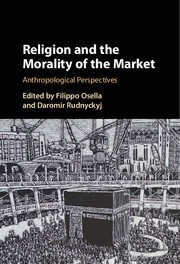Book contents
- Frontmatter
- Dedication
- Contents
- List of Figures
- List of Contributors
- Acknowledgments
- Introduction: Assembling Market and Religious Moralities
- 1 Risk, Fate, Fortune: The Lives and Times of Customs Inspectors in Southern China
- 2 Morality, Markets, and the Gospel of Prosperity
- 3 Religious Myths Retold: Masters and Servants in India's Corporate Culture
- 4 Divine Markets: Ethnographic Notes on Postnationalism and Moral Consumption in India
- 5 Merit Economies in Neoliberal Times: Halal Troubles in Contemporary Sri Lanka
- 6 “Structural Adjustment Islam” and the Religious Economy in Neoliberal Mali
- 7 Assembling Islam and Liberalism: Market Freedom and the Moral Project of Islamic Finance
- 8 Persistent Forms: Catholic Charity Homes and the Limits of Neoliberal Morality
- 9 Marketizing Piety through Charitable Work: Islamic Charities and the Islamization of Middle- Class Families in Indonesia
- 10 “A Poor Muslim Cannot Be a Good Muslim”: Islam, Charitable Giving, and Market Logic in Sri Lanka
- 11 “For God and the Country”: Agricultural Migrations and their Moralities in South India
- 12 “The Globalization of Indifference”: On Pope Francis, Migration and Global Acedia
- Index
- References
9 - Marketizing Piety through Charitable Work: Islamic Charities and the Islamization of Middle- Class Families in Indonesia
Published online by Cambridge University Press: 13 April 2017
- Frontmatter
- Dedication
- Contents
- List of Figures
- List of Contributors
- Acknowledgments
- Introduction: Assembling Market and Religious Moralities
- 1 Risk, Fate, Fortune: The Lives and Times of Customs Inspectors in Southern China
- 2 Morality, Markets, and the Gospel of Prosperity
- 3 Religious Myths Retold: Masters and Servants in India's Corporate Culture
- 4 Divine Markets: Ethnographic Notes on Postnationalism and Moral Consumption in India
- 5 Merit Economies in Neoliberal Times: Halal Troubles in Contemporary Sri Lanka
- 6 “Structural Adjustment Islam” and the Religious Economy in Neoliberal Mali
- 7 Assembling Islam and Liberalism: Market Freedom and the Moral Project of Islamic Finance
- 8 Persistent Forms: Catholic Charity Homes and the Limits of Neoliberal Morality
- 9 Marketizing Piety through Charitable Work: Islamic Charities and the Islamization of Middle- Class Families in Indonesia
- 10 “A Poor Muslim Cannot Be a Good Muslim”: Islam, Charitable Giving, and Market Logic in Sri Lanka
- 11 “For God and the Country”: Agricultural Migrations and their Moralities in South India
- 12 “The Globalization of Indifference”: On Pope Francis, Migration and Global Acedia
- Index
- References
Summary
This chapter underscores how the marketization of spirituality is evident in Islamic charitable practices in Indonesia. In particular, it analyses the philanthropic activities of Daarut Tauhid (DT) and their incorporation into the country's social-economic enterprises. DT is an Islamic organization that offers educational activities and training in both leadership and entrepreneurship. It represents in part a manifestation of what pious Muslims in Indonesia refer to as modern Islam: a mode of religious practice and spirituality characteristic of the urban middle classes in Indonesia. DT was founded by Abdullah Gymnastiar, a popular preacher who is widely known as “Aa Gym” (Aa means elder brother in the local Sundanese language). Aa Gym has received extensive coverage in the media, and his sermons have often been broadcast live by several national television stations. Owing in large part to Aa Gym's visibility, his charitable foundation has become a popular medium through which middle-class Indonesian Muslims fulfil the third pillar of Islam, the payment of zakat or almsgiving.
Since its inception in 1990, DT has been active in collecting charity funds by maintaining a relationship with the middle class, whose members have in fact profoundly contributed to its social, religious and economic development projects. A reciprocal relationship between DT and the Muslim middle class has materialized in DT's response to the growing middle-class demand for Islamic childcare and Islamic education more generally. Through its zakat and charity organization, called Dompet Peduli Umat-Daarut Tauhid (DPU-DT), founded in 1999, DT provides middle-class families with morally and professionally reliable childcare workers, who are a labour force in high demand. As a matter of fact, young women trained in both childcare and the basic tenets of Islamic practice contribute to the Islamization of their employers.
This chapter proposes two central claims. First, Islamic charity (in the form of DPU-DT) draws on religious principles to create a spiritual economy whereby the religiously motivated contributions of pious middle-class Muslims funds the training of young women from rural parts of Java. Second, this spiritual economy is premised on equipping these women not only with the technical skills required of childcare workers, but also with a considerable amount of Islamic expertise.
- Type
- Chapter
- Information
- Religion and the Morality of the Market , pp. 196 - 216Publisher: Cambridge University PressPrint publication year: 2017
References
- 3
- Cited by



